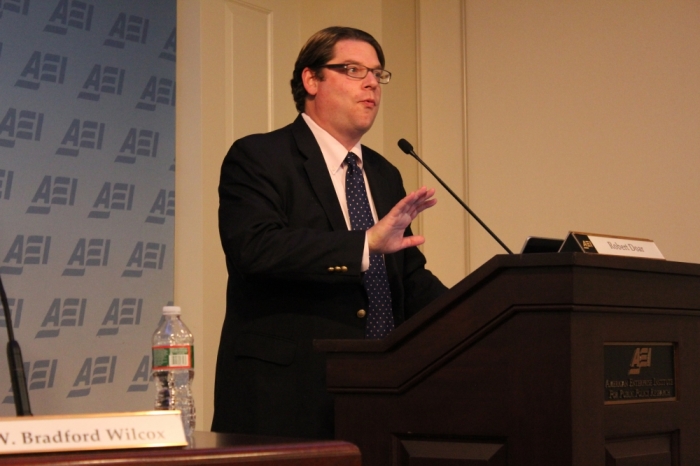College Students With Involved Fathers 98 Percent More Likely to Graduate

WASHINGTON—College students with fathers who were involved in their lives were 98 percent more likely to graduate than students with uninvolved fathers. This was one of the findings presented Wednesday by W. Bradford Wilcox at an American Enterprise Institute presentation, "Graduation day: How dads' involvement impacts higher education success."
Wilcox is an AEI visiting scholar and associate professor of sociology at the University of Virginia, where he directs the National Marriage Project. His data came from the National Longitudinal Study of Adolescent Health, which first interviewed a nationally representative sample of adolescents in 1994-'95, and has interviewed the same group three additional times, most recently in 2008.
The study had several questions that Wilcox used to measure paternal involvement. Respondents were asked how involved their fathers were in their sports activities, helping with homework and talking about personal problems, for instance.
Eighteen percent of the sample reported no involvement from their fathers. The remaining 82 percent were divided into three equal size groups: less involved, involved and highly involved. Those with involved fathers were 98 percent more likely than the uninvolved fathers group to graduate college, and those with highly involved fathers were 105 percent more likely to graduate college than the group with uninvolved fathers. Biological, adoptive and step fathers were all included in the same category for those results.
Marriage made a difference, though. Students whose biological father was married, and stayed married, to their birth mother were more likely to report their father was involved or highly involved in their lives, Wilcox found.

Wilcox also found some class differences in the data. Using the mother's education as a proxy for socioeconomic status, those with a mother who was a college graduate were more likely to have biological, married parents who stayed together and to have a father who was highly involved. Those whose mother was a high school dropout were less likely to have involved fathers and less likely to be raised by their married birth parents.
Wilcox suggested four possible reasons that fathers make a big difference in college graduation:
1) Dads can provide educational stimulus. This can be through helping with homework or simply through their everyday interactions with their children.
2) Families with fathers have more financial stability, which can help pay for private schooling or housing in better school districts. It could also be that dads who have a strong connection to their children are more likely to devote a high amount of financial resources to their college costs.
3) Research shows that dads have different parenting styles than moms. Fathers are more likely to push their children to embrace difficult challenges, for instance. This contribution may "help kids face difficult assignments, take on important opportunities" that could help them in college.
4) Dads protect their kids from situations that could hurt their chances at getting a college education. Research has shown that boys who have a good relationship with their father are less likely to engage in delinquent behavior and girls who have a good relationship with their father are less likely to get pregnant while a teenager.
The presentation included three discussants: Kay Hymowitz, the William E. Simon Fellow at the Manhattan Institute, Patrick Patterson, who manages President Barack Obama's National Responsible Fatherhood Clearinghouse, and Richard Yoder, a first-year Jefferson Scholar at the University of Virginia.
You can watch the full presentation below:




























